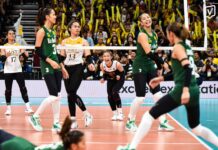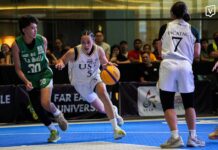WITH THE fast-paced tide of information flowing from different media platforms, quality in journalism should not be overlooked.
This was the central theme of the 17th Inkblots held last Dec. 1 to 3, highlighting a series of lectures from the country’s top journalists.
Award-winning broadcast journalist and ABS-CBN news anchor, Karen Davila described journalism as a “calling,” which should be practiced with responsibly reporting stories to the public.
“In the past, you only get information unilaterally, through only one direct source, but social media has changed that; it is a portal of limitless information,” Davila said in her keynote address, speaking before the 263 campus journalists gathered at the Thomas Aquinas Research Center auditorium.
ANC reporter Christian Esguerra reiterated the journalists’ crucial role in a democracy. He urged student writers to develop skills in the print, broadcast and online platforms, including a better understanding of topics or issues so they would not just parrot what interviewees tell them.
“You need to have a good story to tell to the readers. It’s a mix of providing what the audience wants and what they need,” said Esguerra, former Varsitarian editor-in-chief who founded the Inkblots in 1997.
Palanca awardee and UST instructor Eros Atalia gave a lecture on Filipino journalism and also emphasized the role of journalists in promoting integrity and reliability in publishing trustworthy stories.
“As journalists, isn’t it our role to spread truth, to educate, and to raise awareness?” said Atalia.
He added that journalists can immensely improve their writing by extensively reading both local and foreign work.
Jarius Bondoc, a veteran columnist from the Philippine Star, called on the fellows to develop the initiative in mastering the language.
“We should not be [writing] if we cannot support it with facts. If you want to be a good journalist, you have to master the language,” he said.
Although publications are expected to keep up with the fast pace of information, the quality of the stories and articles published online should not be reduced in the process. Such was explained by former BusinessWorld editor, UST lecturer Felipe Salvosa II, in his talk on campus paper management. He explained the “digital first” policy which uses social media as a platform for faster news dissemination to have a wider audience reach.
“The ‘digital first’ strategy does not mean you will have to abandon print, rather it should vastly improve the print edition,” he said.
Finding the angle
Veteran journalist and long-time editor of the entertainment section of the Manila Bulletin and Tempo, Nestor Cuartero, gave a lecture on feature writing and explained that journalists should know how to choose the right stories and the right people as their sources. Journalists, he said, are a work in progress and their job is mainly centered on reliability, integrity and research.
“Print media has the element of trust that social media lacks. There should be a difference between journalism and information,” he said.
Cartoonist and “Kikomachine” author Manix Abrera challenged the students to value everyday stories that are often overlooked by the audiences to separate themselves from the others and give a fresh look on the stories that others fail to identify and recognize.
This was echoed by Philippine Daily Inquirer assistant sports editor Francis Ochoa, adding that writers should not disregard subtle details which could help improve the quality of a story.
“Always choose to write a compelling story. Strive to look for the little details and never let your writing get in the way of a good story,” he said.
Cuartero’s lecture ended with a mock press conference with actor Enchong Dee, while Ochoa brought in three former Tiger star athletes, Jeric Teng, Jeric Fortuna and Dylan Ababou for a sports conference.
On-the-spot news, sports, and feature writing competitions about the event and mock press conferences were held after the lectures.
Credits and recognition
The 17th Inkblots ended with the presentation of awards for the winners of the on-the-spot writing contests and the first UST National Campus Journalism Awards (UNCJA).
Founded by the two-time editor in chief of the Varsitarian, Julio Macaranas, in honor of his late mother and first writing mentor, Mercedes Macaranas, UNCJA aimed to recognize outstanding work of campus publications in categories of feature, in-depth news, and editorial writing.
The Bataan Peninsula State University’s “The Defender” dominated the competition, winning both feature and editorial categories with the pieces “Ang Tagapangalaga ng Barangay Sta. Elena, Isang Pag-analisa sa Kasalukuyang Estado ng Mangrove Trees” and “Tactless Diction.” The Faculty of Arts and Letters’ “The Flame,” meanwhile, claimed the award for in-depth news for the “UST Bargains Tuition and Other Fees Increase; Artlets Expect Improved Facilities, Instruction” write-up. Vianca T. Ocampo
















